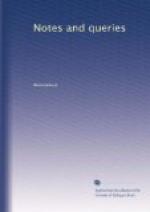I am less inclined to entertain any doubt of the view I have taken being correct, from the confirmation it receives in another passage of Shakspeare, which runs as follows:
“If virtue no delighted beauty
lack,
Your son-in-law shows far more fair than
black.”
Othello, Act i. Sc. 3.
Passing by the cool impertinence of one editor, who asserts that Shakspeare frequently used the past for the present participle, and the almost equally cool correction of another, who places the explanatory note “delightful” at the bottom of the page, I will merely remark that the two latest editors of Shakspeare, having apparently nothing to say on the subject, have very wisely said nothing. Yet, as we understand the term “delighted,” the passage surely needs explanation. We cannot suppose that Shakspeare used epithets so weakening as “delighting” or “delightful.” The meaning of the passage would appear to be this: If virtue be not wanting in beauty—such beauty as can belong to virtue, not physical, but of a higher kind, and freed from all material elements—then your son-in-law, black though he is, shows far more fair than black, possessing, in fact, this _abstract_ kind of beauty to that degree that his colour is forgotten. In short, “delighted” here seems to mean, _lightened_ of all that is gross or unessential.
There is yet another instance in Cymbeline, which seems to bear a similar construction:
“Whom best I love, I cross:
to make my gifts
The more delay’d, delighted.”
Act v. Sc. 4.
That is, “the more delighted;” the longer held back, the better worth having; lightened of whatever might detract from their value, that is, refined or purified. In making the remark here, that “delighted” refers not to the recipient nor to the giver, but to the gifts, I pass by the nonsense that the greatest master of the English language did not heed the distinction between the past and the present participles, as not worth a second thought.
The word appears to have had a distinct value of its own, and is not to be explained by any other single word. If this be so, it could hardly have been coined by Shakspeare. Though, possibly, it may never have been much used, perhaps some of your correspondents may be able to furnish other instances from other writers.
SAMUEL HICKSON.
St. John’s Wood.
* * * * *
AUTHORS OF “THE ROLLIAD.”
The subjoined list of the authors of The Rolliad, though less complete than I could have wished, is, I believe, substantially correct, and may, therefore, be acceptable to your readers. The names were transcribed by me from a copy of the ninth edition of The Rolliad (1791), still in the library at Sunninghill Park, in which they had been recorded on the first page of the respective papers.




